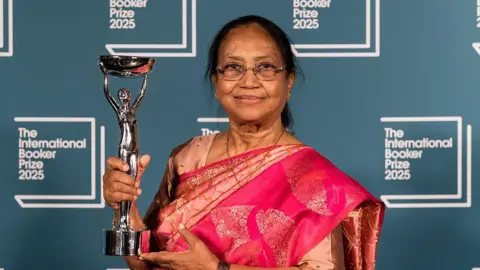Renowned Indian writer, lawyer, and activist Banu Mushtaq has etched her name in literary history by winning the prestigious International Booker Prize for her short story anthology, *Heart Lamp*. This remarkable achievement marks the first time a book written in Kannada, the official language of the southern Indian state of Karnataka, has received this esteemed honor. The collection was translated into English by Deepa Bhasthi and encompasses twelve powerful stories that span over three decades, focusing on the trials and tribulations of Muslim women in southern India.
Mushtaq's accolade follows the 2022 success of Geetanjali Shree’s *Tomb of Sand*, which was translated from Hindi. While Mushtaq's literary works have garnered recognition among avid readers, this award has amplified awareness of her life and writings, which poignantly reflect the socio-cultural challenges faced by women shaped by religious conservatism and patriarchal norms.
Critics have praised her collection for highlighting the quiet yet profound strength of individuals who navigate their struggles. A review from the *Indian Express* stated, "In a literary culture that rewards spectacle, *Heart Lamp* insists on the value of attention — to lives lived at the edges, to unnoticed choices, to the strength it takes simply to persist."
Raised in a modest Muslim neighborhood in Karnataka, Mushtaq's early education included studying the Quran in Urdu before her father enrolled her in a convent school where Kannada was the medium of instruction. This multilingual background became instrumental as she ventured into writing, drawing from her experiences and observations of the world around her.
Mushtaq’s journey as a writer began during her challenging early married life, which she has openly discussed in several interviews. In her struggles, including grappling with postpartum depression and societal expectations, she encountered a pivotal moment when a desperate act of defiance reawakened her passion for writing.
In one account, Mushtaq recalled a harrowing episode of attempting to set herself on fire, only to be saved by her husband’s intervention. It is this spirit of resistance that permeates her characters, as they push back against their constraints, defying the traditional roles often assigned to women in mainstream literature.
Drawing from her rich experience, Mushtaq has worked in journalism alongside her literary pursuits and has been an active participant in the Bandaya movement, an advocate for social justice through literature. She later transitioned to practicing law, all the while producing a vast array of written works, including multiple short story collections and essays.
Despite facing threats and backlash for her forthright views, particularly regarding women's rights, Mushtaq has remained undeterred and committed to representing the realities of marginalized communities through her work. Her perseverance has been recognized with numerous accolades, including the Karnataka Sahitya Academy Award and the Daana Chintamani Attimabbe Award. In 2024, Mushtaq's earlier works, compiled under *Haseena and Other Stories*, also won the PEN Translation Prize, further solidifying her place in contemporary literature.
Through *Heart Lamp*, Mushtaq has not only forged a path for Kannada literature on the global stage but has also gifted a voice to the untold stories of resilience among women in her community. Her triumph is a testament to the power of storytelling in bringing marginalized experiences to the forefront.


















